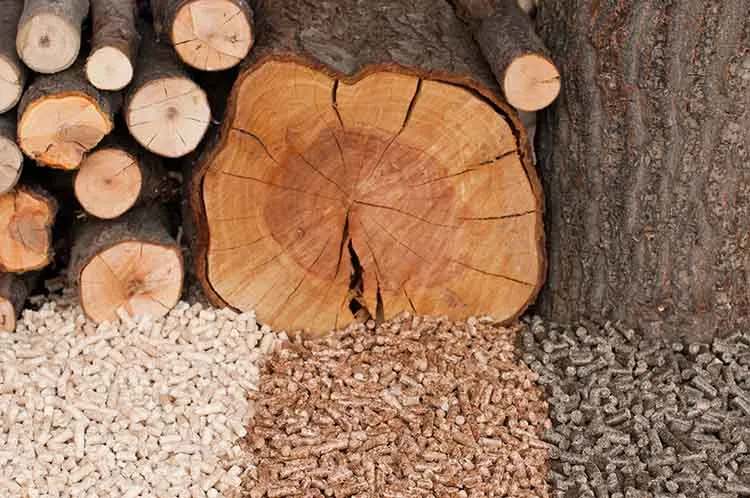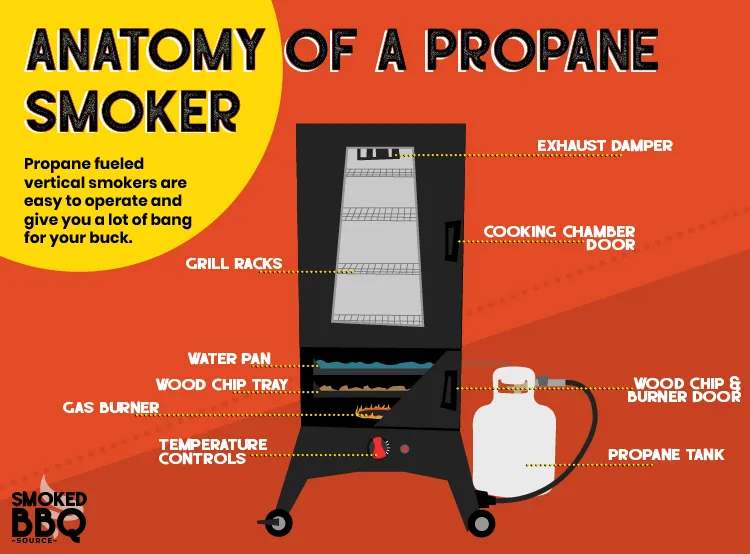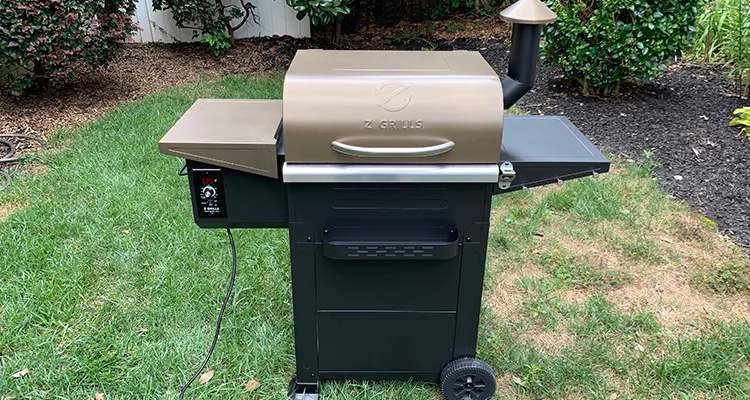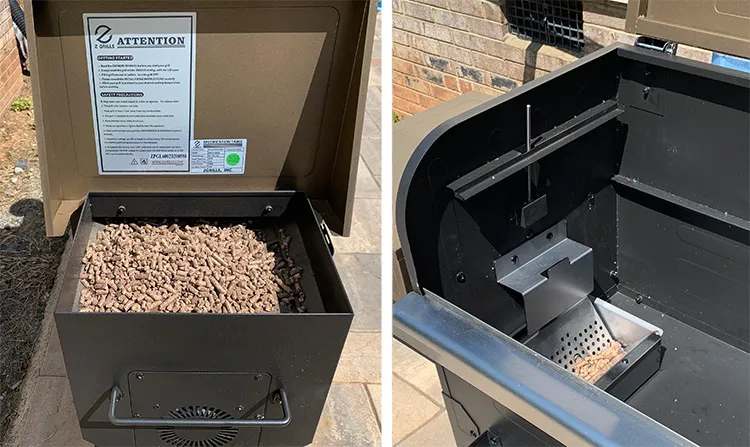Are you stuck between choosing a simple and affordable propane smoker and a high-tech pellet grill/smoker?
Want to know which one will give you the best results?
In this article, we’ll be breaking down the pros and cons of pellet smokers vs propane smokers.
With the differences between made clear, you’ll be able to find exactly the kind of smoker you need to get that perfect smokey flavor that all pitmasters love!
This is part of a series of articles comparing different types of smokers:
- Pellet Grill vs Gas Grill
- Propane vs Electric Smoker
What’s the big difference between propane & pellet smokers?
Pellet and propane both offer ‘set it and forget it’ smoking capability, but that’s about where the similarities end.
The first obvious difference between a propane smoker and a pellet smoker is the fuel they use.
Pellet smokers make use of wood pellets. These pellets are generally made from hardwood ground down into sawdust and then compacted into pellets through the use of heat and pressure.

The main benefit of using a pellet smoker is that you are using wood as a fuel, which provides its own smokey flavor.
They also tend to be quite high-tech with companies like Traeger and Green Mountain Grills offering models with WiFi so you can control them with an app from the comfort of the couch.
The main downsides to a pellet smoker is the price, which can run from $500 to around $1800. Pellet grills are also quite bulky and generally need to be plugged into an electrical outlet.
Fuel availability is also a concern, as the smoker only runs on pellets and these can cost up to $2 a pound.
Unsurprisingly, propane smokers run from a propane tank. Compared to a pellet smoker, propane smokers are simple to operate and easy to fix.
Propane and propane accessories are readily available at a number of outlets. For instance, it is useful to have a good propane tank gauge to make sure that there is enough fuel in the tank for your next cookout.
The main benefit of a propane smoker is the ease of use and the fact that you can achieve similar results to a traditional charcoal smoker.
The main downside to propane smokers is that the fumes from the gas have been known to add a slight flavor to the meat. Although, how much this affects the flavor seems to be somewhat subjective, with some claiming not to be able to taste it at all.
Propane smoker overview

Generally, propane smokers are built in a cabinet arrangement, with the gas burner at the bottom. Above this are a woodchip tray and a water pan with the grill racks arranged above them.
The propane comes from an external cylinder connected via a gas pipe, making changing out the bottle relatively uncomplicated.
Propane smokers can be brought up to heat quickly, and it is easier to control the temperature with gas than it is with organic combustibles, like wood, pellets, or charcoal.
One of the best things about a propane smoker is that they are reasonably compact, lightweight, and don’t need a socket around to work. This means you can move them around as necessary, take them camping and to outdoor events, like cookouts or tailgates.
Propane smoker pros:
- Propane is freely available from a variety of vendors and for reasonable prices.
- Propane smokers themselves tend to be very affordable, with budget models running to around $200.
- Propane smokers are conveniently portable and tend to be quite lightweight without their gas tank. This means you can site and transport them without undue hassle.
- Propane smokers are easy to use and easy to maintain. Replacement parts for gas smokers are easy to find and fit.
Propane Smoker Cons:
- You will always need to have two gas canisters on hand, as it can be hard to tell how much gas you have left and you don’t want it running out ⅔ of the way through a low and slow smoking session.
- Some people claim that the mixture of gas fumes and the moisture on the meat creates a particular taste they find unpleasant. Although other people dispute this.
- Depending on what model you buy, you may need to keep an eye on it to make sure the temperature doesn’t get too high, as budget models can run hot.
- During a long smoking session, the wood chip pan may need to be refilled several times.
- Some models suffer from poor insulation. On very cold or very windy days, you might find the temperature fluctuates because of this.
Pellet smoker overview
The name “pellet smoker” is a little misleading, as most pellet-fired machines are a combination of smoker, oven, and grill.
They actually perform best as smokers and struggle to reach high heat required to sear.

Compared to propane smokers, pellet smokers tend to be larger, heavier, and more expensive, both to buy and to fuel.
Pellets designed for use in a pellet smoker should not be confused with wood pellets designed for use in indoor heating stoves. Those are only for use as a heating method and contain chemicals that can flavor the meat.
The pellets used in a pellet smoker are made of compacted sawdust bonded together with the wood’s natural lignin. They contain only 100% wood and come in different ‘flavors’ made from various woods.
You pour wood pellets into a hopper on the side of the smoker. An electrically powered augur, connected to the temperature controls, then feeds enough pellets into the cooking chamber to keep the temperature steady.

The team over at Pitboss suggests that you need around “2 lbs. of pellets for every hour of smoking low and slow or 4 lbs. for every hour of grilling hot and fast.”
Cooking is done through oven-style indirect heat with airflow provided by a convection fan. Both the fan and the temperature controls are electric, so you will need to set up your pellet smoker by an outlet.
Pellet smokers have the advantage of using a wood-based fuel, so your choice of fuel automatically adds to the flavor of the meat.
Depending on which model you buy, they also offer a greater level of flexibility than a propane smoker. This is because pellet smokers also act as a grill and an oven in addition to being able to smoke meat.
Pellet smoker pros:
- The fuel pellets are made from 100% wood, meaning you get that woodsmoke tang just from the fuel you are using. You can also choose different wood types to experiment with.
- The temperature controls are accurate and automatically feed the required amount of pellets into the smoker to keep the temperature stable.
- A ‘pellet smoker’ is, in fact, a smoker, grill and oven all rolled into one, making them very versatile.
- Smoke pellets produce very little ash, with a 40lb bag of pellets resulting in just half a cup of ash. This makes clean up quick and easy, so you can spend more time enjoying the fruits of your labors.
- Some models come with advanced tech features like WiFi that let you control your grill from your phone.
Pellet smoker Cons:
- Wooden fuel pellets are not as widely available as gas or charcoal, so getting hold of them on short notice can be difficult. They can also be quite expensive compared to other fuels.
- Because the augur, temperature controls, and convection fan are all-electric, your pellet smoker will need to be plugged into an outlet, reducing its portability.
- By comparison to a propane smoker, a pellet smoker can be quite costly. Often double the price of a gas smoker or more. This is, however, offset by its greater versatility.
- If exposed to moisture, or if damp gets into the pellet hopper, your wood pellets will disintegrate into useless mush. So you will need to store them somewhere dry.
Pellet Smoker and Propane Smokers – Head to head
When it comes to choosing between a propane smoker and a pellet smoker the good news is that they are very different beasts.
Propane smokers are simple to use, easy to find fuel for, and generally very portable. So, if you can see your smoker getting used on camping trips and cookouts, then propane is probably the right choice for you.
A pellet smoker is an ideal choice if you want to have maximum control over temperature and the flavors imparted by your fuel. The wooden pellets you’ll be burning take an active hand in flavoring your meat, even if they are a little harder to source than gas.
The pellet smoker is also a more complicated and more versatile machine. The augur and convection fan-driven combustion system means you can get excellent temperature control, although it won’t run as hot as a propane smoker.
Pellet grills also tend to be heavy and need an electrical outlet. So, if portability is something you are happy to trade away for additional controls over temperature and the flavor of your smoke, then a pellet smoker is the one for you.
This isn’t always the case though. The Traeger Tailgater and the Green Mountain Grills Davy Crockett are both excellent portable pellet grills.
If you still don’t have quite enough details to make up your mind, here are a few extra factors you might want to take into consideration.
Cost:
There is a pretty steep gap between the price of propane smokers and pellet smokers. You can pick up a budget propane smoker for around $100, but a pellet smoker can cost you between $500 and $2000+
Ease Of Use:
Depending on your model, propane smokers tend to run a little hot and are not the best-insulated devices. This can mean you need to keep an eye out for temperature fluctuations.
By comparison, pellet smokers let you have fine control over your temperature and, because of their linked fuel-feed and temperature sensors, they are the ultimate in “fire and forget” smokers.
Fuel Access:
Most gas stations will sell you a propane tank, but only a certain number of places are going to sell you high quality 100% wood pellets specifically for your pellet smoker. If you don’t live near a supplier, you are going to need to stockpile pellets, which could be costly.
Repair:
Propane smokers tend to be quite simple machines that use easy to find and easy to replace generic gas burner parts. Pellet smokers, on the other hand, use more delicate and more bespoke parts, which and be hard to replace in a hurry.
Top Electric and Propane Brands
Now that you’ve got all the information you need in order to make your choice, the next step is to find a reliable brand.
For propane smokers, Masterbuilt and Char-Broil are well-known brands that offer good quality products.
At the more budget end of the market, look for Smoke Hollow or Camp Chef, but be aware these smokers will need a little babysitting to keep the temperature level.
For pellet smokers, three of the best-known brands are Z Grills, Pit Boss, and Traeger Grills, all of which offer excellent pellet grills.
Z Grills and Pit Boss are both on the budget end, although neither will be as cheap as a budget propane smoker.
Wrapping it up
At the end of the day, the choice between pellets and propane comes down to what you want from your smoker.
If you are looking for something reliable and portable that you can bring to wherever the party is and be 99% sure you’ll be able to pick up extra fuel on the way, the get yourself a propane grill.
If you are happy to spend a little extra and want more control at the price of portability, then the pellet smoker is the one for you. Just make sure you can get hold to the right kind of pellets before you splash the cash.
Do you have a particular favorite between pellets and propane? Do you have a unique mix of pellets that gives you the best smoke every time? If you do, we’d love it if you’d leave us a comment below and let us know!